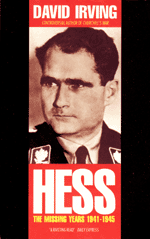
David Irving
recalls something of the history of this
book:
WHILE researching in the Federal Records
Center in Suitland, Maryland, in the early 1980s
with a highly capable English assistant,
Susanna Scott-Gall, I took to trawling
"from left to right" through hundreds of boxes
of US intelligence papers. This took me to the
Intelligence files collected for the Nuremberg
Trials of Major War Criminals, and in one of
these boxes of documents we came across
anonymous notebooks, of British Army origin (all
printed "HMSO" on the cover) but with no other
identification.
They contained the medical records on some
unidentified individual, referred to only as
"Z", commencing in June 1941 and ending in
October 1945. It did not take much brainwork to
deduce that Z was none other than Hitler's
deputy, Rudolf Hess, who had flown to
Scotland in May 1941 on an abortive peace
mission. Mr Winston Churchill had ordered
him detained as his own personal prisoner, and
he was held in a number of different locations,
including the Tower of London and a mental
hospital in Wales, until he was flown to
Nuremberg to be put on trial in 1945.
These diaries became the backbone of this
book project. Susanna shortly found in the
Imperial War Museum's archives the private
handwritten diary kept by the commandant of
Mytchett Place, the first secret mansion in
which Hess was held, near Aldershot -- every
room was bugged with highly sensitive
mcirophones, and the recordings minutely
transcribed for Intelligence purposes.
The story that emerged from these and other
papers that I collected over the next two years
was a tragic one: Hess had made his brave lone
flight to Scotland, armed only with a photo of
his four year old boy Wolf-Rüdiger
Hess, whom he would not see again for the
next 25 years, and a letter to HM King George
VI setting out the very generous peace offer
that Hitler wished to bring to the attention of
the British people. Churchill, probably aware of
the impending flight, had Hess intercepted and
it is not known whether the letter ever reached
the King (there are grounds to believe that it
did).
Disturbed by the failure of his peace
mission, Hess became a victim of his deep,
latent schizophrenia, particularly after a
botched attempt at interrogating him with truth
drugs in 1944.
 THE history of the book is scarcely less
adventurous. I completed it in March 1987 in Key
West, Florida, and flew to New York with the
manuscript the next day. When I checked out of
the Algonquin Hotel the following morning, the
driver of a cab standing outside the hotel
volunteered to carry us to La Guardia airport. I
carried the cases outside, and left the cabby to
load the car.
THE history of the book is scarcely less
adventurous. I completed it in March 1987 in Key
West, Florida, and flew to New York with the
manuscript the next day. When I checked out of
the Algonquin Hotel the following morning, the
driver of a cab standing outside the hotel
volunteered to carry us to La Guardia airport. I
carried the cases outside, and left the cabby to
load the car.
When I came out the cabby was scratching his
head -- one case had just vanished into thin
air. "That way," shouted a helpful bystander who
had been leaning against the wall: "He ran off
with it that way," I charged off in the
direction that he pointed, westwards, down the
street. But the thief had vanished, and so had
my case; and so too, when I returned, had the
"bystander" who had been his accomplice.
The completed Hess manuscript was in
the stolen bag: I would never rewrite it, that I
knew. It was my lost masterpiece.
 My
despair was short-lived. Susanna, the perfect
personal assistant in every way, announced that
she had made a Xerox copy only two days earlier,
and had already mailed it safely to the Austrian
publisher in Graz who was to publish a
German-language edition (right).
My
despair was short-lived. Susanna, the perfect
personal assistant in every way, announced that
she had made a Xerox copy only two days earlier,
and had already mailed it safely to the Austrian
publisher in Graz who was to publish a
German-language edition (right).
For commercial reasons, my editor at
Macmillan Ltd Adam Sisman, elected to
hold back the book's release until whenever Hess
died in Spandau jail: "We will have it typeset
and ready to launch by then," he promised.
Hess died, strangled, a few weeks later, in
August 1987, after serving forty-six years of
his life sentence -- the last twenty-two of them
in solitary confinement. I heard the news of the
prisoner's death on a Black cab's radio as I
returned from Heathrow.
For days the British newspaper headlines were
full of the mystery of how Hitler's deputy had
died.
It now turned out that Macmillan had
forgotten to have the book edited or typeset.
Days passed, then weeks. The precious moment was
lost, as too were the twelve proof copies of the
book that Macmillan's meanwhile sent over to
publishers in America. Penny-pinching like the
worst of their kind, these canny publishers had
made a habit of shipping heavy packages over to
Hilversum, Holland, in a monthly container for
onward mailing to the USA, since their
accountants had learned that mailing parcels
from Holland was marginally cheaper.
The container was lost, and Macmillan never
found out until a year later. For twelve months
they -- and I -- pondered the mystery of why no
US publisher had offered for my Hess: The
Missing Years. They kept the secret from
me.
Adam Sisman confessed the truth to me years
later. By the time Macmillan's realized their
blunder, the hour had passed and Rudolf Hess
was, well, history. Hess: The Missing
Years became (like Uprising)
one of my only books which did not appear in the
United States: and of course Goebbels.
Mastermind of the Third Reich , but that is
another
story. 
This page uploaded
Monday, August 26, 2002; German edition uploaded
Saturday, September 6, 2003; 2010 Focal POint
Classic edition uploaded Monday, December 28,
2009
 Our
Rudolf Hess index
Our
Rudolf Hess index



